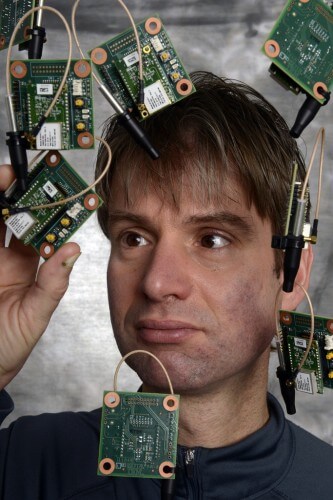According to Oded Cohen, director of the IBM laboratory in Haifa, in the next five years, computers will be able to imitate and integrate the way the senses work and will make us more aware of the environment and more productive in our work

IBM presents its updated technological forecast for 2013, and points to five technologies that - according to its assessment - will play a central role in our lives in the next five years. IBM's technological forecast is based on the assessments of thousands of biologists, engineers, mathematicians and doctors employed in the company's research laboratories: IBM currently operates the largest industrial research body in the world.
In the next five years, computers will be able to imitate and integrate the way the human senses work - making us more aware of the environment and more productive in our work. The first machines with independent sensing capabilities are already operating in various fields - for example, automatic independent parking capabilities that are already integrated into luxury cars. The technology company that built, among other things, "Watson", a computer with a self-learning capacity of unstructured information, which communicates with its environment through speech - is now presenting detailed predictions that focus on the world of the human senses.
Touch and feel: the mobile phone will allow you to touch and feel distant objects. IBM scientists bring the sense of touch to the world of shopping from mobile devices: they develop applications for shopping from the smartphone, which allow shoppers to feel the texture and fabric of clothes, for example, by moving a finger over the image of the item they are interested in - as it is displayed on the phone screen.
Vision: One pixel is worth a thousand words. According to the prediction of IBM scientists, within the next five years, computer systems will be able to observe and identify visual information, such as images displayed on the web, medical imaging images, or video from traffic control cameras - and translate the pixels into meaning, in a similar way to the process of human vision. This way, for example, the camera will know how to distinguish and define a traffic jam, or a suspicious spot on an X-ray - similar to a traffic center man or a doctor looking at these images today.
Hearing: Computers will hear the things that really matter. Sounds, voices, sound density and air movement that creates these sounds - in a wide range of frequencies, which are not at all exposed to the human ear - will be picked up by computers and identified by them. Thus, it will be possible to predict, for example, the collapse of trees, or to warn against mudslides and mudslides. The electronic machines of the future will also be able to understand the content behind babies' murmurs - and explain to parents whether the baby's cries indicate hunger, fatigue or pain.
Taste: Sensors will help you eat smarter. The combination that is considered unattainable, between "tasty" and "healthy" - is possible with the help of a new type of computer systems designed to promote innovation in the field of food and taste. A machine capable of experiencing and analyzing flavors will determine the exact chemical structure of various foods, and explain why people like them. In this way, it will be possible to offer healthier foods - without sacrificing the taste - and surprise the connoisseurs of the palate with combinations of different foods and ingredients that enhance the taste experience.
Smell: The computers will be able to sense and interpret smells. Your mobile phone will be able to detect a developing cold or disease - by sensing and analyzing millions of molecules emitted from your respiratory system. Computers will "smell" chemicals in an urban environment, in order to monitor air pollution or analyze the condition of the soil used for agricultural crops. Simple and cheap measurement systems will provide an indication down to the single molecule level.
BMW explains that the improved sensing capabilities will help us to be more aware of the world around us, to enjoy improved work productivity, and to think - but they will not think for us. Computer systems with awareness and recognition will allow a better look at complex problems, will ensure successful dealing with the rapid flow of huge amounts of information, will lead to more informed decisions, will improve health and quality of life, will enrich our lives and will break through barriers such as geographic distance, language, costs or accessibility problems of services and technologies.
According to Oded Cohen, director of IBM's research laboratory in Israel, "just as the human brain relies on interacting with the world through a variety of senses, so advanced cognitive systems will be able to offer value to users, present insights and help solve some of the most complex challenges facing the human race."

5 תגובות
The opposite question is asked - will the computer be able to communicate with us through a sense other than sight? Today, most of the information passes visually, and some by hearing. Can we open new communication channels and create new languages, based on... smell?
Will a new email have its own smell (I'm guessing, a fresh bun)
Or will a typo in a word processor smell like burnt paper?
And what about taste? Can we connect to the computer with a straw on our tongue, and choose to surf to a blog that is more "to our taste"?
Everything sounds possible to me in 5 years except for the ads. We don't even know what it is with people, so how will they do it with machines?
They might be able to pass the Turing test and then the question arises: Is there any meaning to the indistinguishable difference between "conscious" and "a good imitation of a conscious"